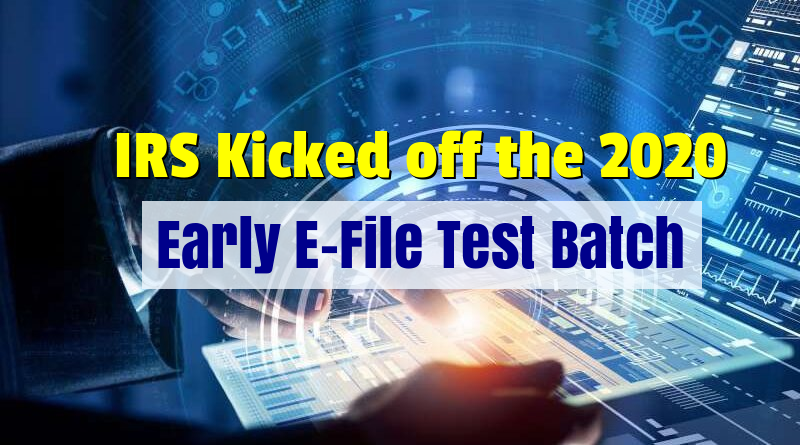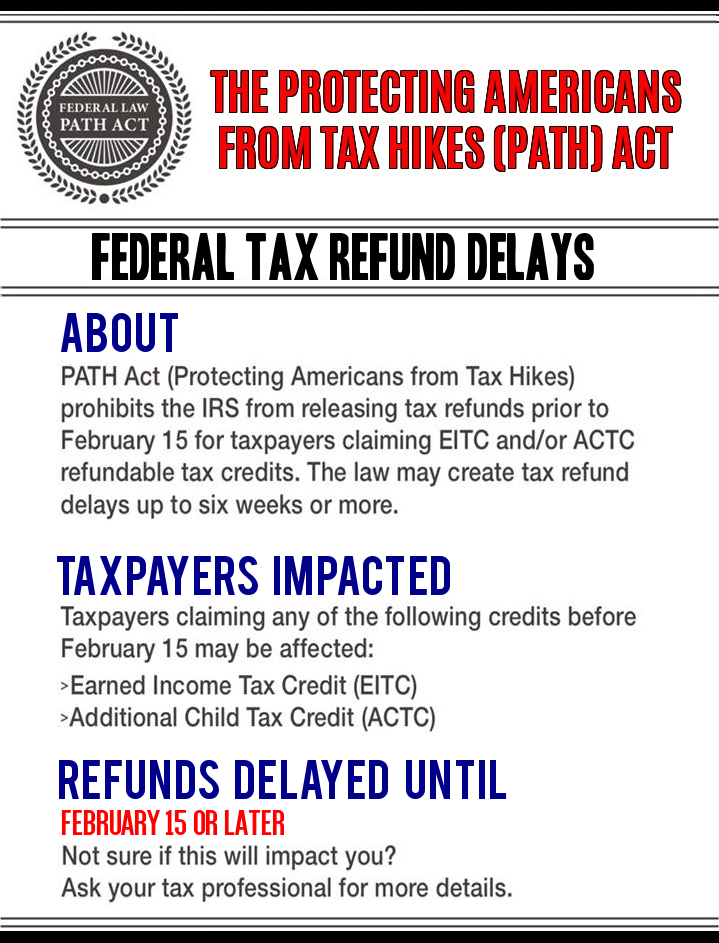
The IRS has announced that the 2020 tax filing season will begin on January 27, 2020. Tax preparation companies will be participating in the controlled launch of the e-file system (HUB Testing) with the IRS between the dates of Monday, January 13 – Wednesday, January 15 and Tuesday, January 21 – Thursday, January 23. During this time, tax preparation companies will be sending batches of tax returns to the IRS for processing.
| Test Batch | Dates |
|---|---|
| Batch 1 | Monday, January 13 - Wednesday, January 15, 2020 |
| Batch 2 | Tuesday, January 21 - Thursday, January 23, 2020 |
Some taxpayers may begin to receive IRS acknowledgments as early as Tuesday, January 14.
Due to tax law changes put in place by the PATH Act in 2017, the IRS cannot issue refunds for taxpayers claiming the Earned Income Tax Credit (EITC), Additional Child Tax Credit (ACTC) or the refundable portion of the American Opportunity Credit (AOC) until February 15, 2020. We recommend using the Where’s My Refund? tool on IRS.gov to get information about when you may receive your refund.
Please be advised that any return you transmit will be sent to the IRS for processing. Due to MeF (Modernized e-File), once you transmit a return, the return CANNOT be deleted from the server.
- State Tax Departments will begin processing state-only return transmissions on January 30, 2020.
- Business e-File opened on January 7, 2020.
What is an IRS HUB Testing or Test Batch?
HUB Testing or (Test Batch) is an initial run of a batch of tax returns. The IRS will pull a few early tax returns from all their registered tax preparers to make sure the software is running up to speed.
Every tax season about a week in advance the IRS routinely runs a Controlled Release Process(“test batch”) from various e-file providers (including free online e-file services) every year to test their systems. A small number of e-filed tax returns may be transmitted to the IRS, and taxpayers may see real acknowledgments and rejects as a result. The income tax returns included in this testing procedure are randomly selected from “batches” of completed tax returns that are queued for transmission for the official opening date January 27th when the general e-file processing begins. This testing period DOES include not only the acceptance of these tax returns via e-file but also the processing of the returns including the issuing of any tax refunds. Based on previous years we have seen test batch returns actually receive their tax refunds usually in the first batch of deposits as long as they filed an accurate and honest return that had no processing issues.
How many tax returns does the IRS pull for test batches?
- The IRS Processed around 150,000,000 E-Filed Returns in 2019 and the number of early filed tax returns selected for test batches could be fewer than 10 million.
Please Don’t Get Your Hopes Too High… The majority of all e-filed returns submitted early will be held until the IRS Modernized e-File (MeF) system opens this year on January 27th.
If my tax return is selected in the test batches will I get my tax refund any sooner?
- If you have a tax return that does not have the EITC/ACTC Credits you could possibly get a refund as soon as the first few weeks in February.
- If your tax return includes the EITC/ACTC Credits and completes the test batches your tax return will still be on hold with a PATH message until after February 15, 2020.

Many different factors can affect the timing of your tax refund after the IRS receives your return. Even though the IRS issue most refunds in less than 21 days, it’s possible your refund may take longer. Also, remember to take into consideration the time it takes for your financial institution to post the refund to your account or for you to receive it by mail.
Taxpayers who claim the Earned Income Tax Credit or the Additional Child Tax Credit may experience a refund hold. According to the Protecting Americans from Tax Hikes (PATH) Act, the IRS cannot issue these refunds before mid-February. The IRS expects the earliest EITC/ACTC related refunds to be available in taxpayer bank accounts or debit cards starting February 27, 2020, if these taxpayers chose direct deposit and there are no other issues with their tax return.
Where’s My Refund? on IRS.gov and the IRS2Go mobile app will be updated on February 16 for the vast majority of early filers who claimed the Earned Income Tax Credit or the Additional Child Tax Credit. Before February 16, some of these filers may see a projected date or a message that the IRS is processing their return. These taxpayers will not see a refund date on Where’s My Refund? or through their software packages until then. The IRS, tax preparers and tax software will not have additional information on refund dates, so Where’s My Refund? remains the best way to check the status of a refund.
*Just Remember no matter how early you e-file your tax return. There is no guarantee that tax returns sent to the IRS Electronic Filing Center from your tax preparation service will be transmitted to IRS early.

